- Home
- Patricia McLinn
Warm Front Page 19
Warm Front Read online
Page 19
“I am.”
She took his face between her hands and brought it up to hers. “Are you going to do something about that?”
“Yeah, I am.”
“Now.”
He complied.
*
He returned from the bathroom, and immediately brought her up against him.
She looked surprised when her body responded to the contact.
“Quince, that was… I haven’t… Not since…”
Celibate since her husband died. And surprised that her body still experiences desire. And the complete and happy satisfaction of that desire.
“I know. It’ll take me a while, but in the meantime…”
*
She woke to the smell of corn chowder and toasted cheese.
Quince, wearing only jeans, held a tray with mugs and plates and glasses of water.
She sat up, pulling the covers with her. “You can cook.”
“Toasted cheese and the microwave. That’s it. I haven’t been holding out on you. You just picked the right menu tonight. Hungry?”
“Starved.”
He shed the jeans and they wedged pillows behind them and ate their dinner. Once he stopped to kiss a smudge of corn chowder from the corner of her mouth, which meant they ate the rest cold.
With the tray removed, they slid down under the covers, spooned into each other’s warmth.
She talked about her family, as if introducing them to him, one by one.
“Now tell me about yours,” she said.
“Mine’s not worth talking about.”
“But—
“Really.”
“But,” she said again, more slowly, “Fiona is worth talking about.”
She felt a slight change in his breathing.
“Will you tell me about her?”
He told about their meeting outside the dorm the day he arrived, about the invitation to come to the party in her room with his roommate, about their conspiracy to get Zeke out, mingling with people. “We took those psych classes to learn ways to deal with him, took them together when she could.”
“When she could?”
“She was already sick. When I got there as a freshman, she was returning after missing a year because of tests and treatments. She knew it was fatal. Told me so two weeks into our dating because she said it wouldn’t be fair not to. But she was not done living. She taught me more about living in the five years with her than my parents ever did. Well, maybe that’s not a fair comparison, since my mother wasn’t around long. But you get the point.
“She also drew me into her family. Great people. A true family.” He shook his head. “I hadn’t known people existed like that. They’re not perfect. They’d be the first to say that. But funny, generous, open, and they love each other like crazy. Her parents, her older brother, and her younger sister. They live in Palo Alto. She could have lived at home, especially … later. But she wanted the whole college experience. And they supported her.”
She turned over to be able to see him.
“She made it, too. Graduated. Walked up and got her diploma.”
He hadn’t been smiling exactly but now the lines of his face shifted, leaving only the sorrow, devoid of the good memories.
“She wouldn’t marry me,” he said abruptly. “I must have asked hundreds of times the last month. She’d just say, No, Peter. Every time. No, Peter.”
Fiona had said no and now he said he never would marry.
“She said it was because of insurance. She was on her parents’. If we married, that would end, and I was right out of school, didn’t have any. She’d laugh and say she couldn’t afford to marry me.”
“I’m so sorry, Quince. So very sorry for your terrible, terrible loss.”
Slowly he brought his gaze to hers. “Do you know my father never once said those words to me?”
“Never? But…”
“He was too busy making plans. How I could contribute to his company after the delay of a year after graduation. That’s all Fiona’s last year was to him — a delay. The hell of it was, I was too numb to even fight him. I was a robot, going through the motions because I had nothing left.” A flicker touched his lips. “Until Zeke came and kidnapped me.”
“Not literally?”
“Yeah, pretty much. He doesn’t talk about it, and I don’t remember much until I was sitting in the passenger seat of this old beater of a car Zeke had. And a dim memory of my father shouting never to darken his door again or something like that. And Zeke saying, ‘Wave good-bye, Quince.’ And I did. Haven’t seen him since.”
“Oh, Quince, that’s— Sorry.” She’d put her hand on his chest, then snatched it back.
“What?”
“My hands. They’re so rough. All the work. No matter how much lotion…”
He took her hand in both of his, kissed each fingertip, then returned it to his chest. “It feels perfect.”
She laughed a little, hoping it didn’t come out as giddy as it felt. The sensation of his lips on her fingertips … after all they’d done, how could that have her ready in an instant to do more?
“Perfect? A farmer’s hands? I don’t think so. My farmer’s hands. My farmer’s hands have the touch,” he murmured.
He must be three-quarters asleep, lulled by the catharsis of what he’d told her, because his words weren’t making a lot of sense.
That was fine with her. She drifted, too. Not thinking, not planning, not even worrying. Just existing in this soft cloud between desire sated and desire renewed. Wanting and being wanted.
Anyone looking at them from the outside might wonder at what a man like Quince saw in her. She smiled slowly. She suspected a few might wonder what she saw in him, complete non-farmer that he was.
But they were a match in wanting. A perfect match.
Awareness suddenly concentrated back in to the tips of her fingers. Because under them his heart had picked up a stronger, harder rhythm.
“What’s this about?” She spread her hand over that heartbeat.
“I have an idea.”
She kissed his chest and felt his heart jump under her lips. “Must be a good one.”
“I think so.” He wrapped his arms around her and drew her on top of him. “I think it’s an excellent idea.”
*
That had been a great idea.
He could only hope that the one he hadn’t told her about would turn out half as good.
It wasn’t ready. There were still a lot of holes to fill.
But there was no choice. It wasn’t something he could keep from her after tonight.
He had to tell her, Everett, and the others. Right away.
That’s what had started his heart going faster … until her touch had done a much, much better job of that.
*
Quince was downstairs, but Anne was still in the shower upstairs when Everett came in the next morning, having gotten a ride with a plow driver he knew.
He was in a noticeably good mood, though he did cast one look up toward the ceiling in apparent recognition that the sound of running water emanated from the master bathroom.
Later, after Quince helped Anne clean up the breakfast dishes, he said, “I’d like you to come with me on a short drive. Both of you.”
“I want to check my bids for—”
“It’s important, Anne.”
“How would we all fit in that car of yours?” Everett demanded.
Quince said, “We’ll take the farm truck.”
*
They humored him. Including letting him drive.
They weren’t even all that curious. Not until he turned off the highway, at a spot that was clearly familiar to both of them, judging by the look they exchanged.
He brought them to the rise he’d scoped out that gave a good view of the land stretching out to the northwest, with the flow of rich soil interrupted only by the house and buildings set against a protective windbreak of firs, and a ribbon of trees tracing the river�
��s route.
“Let’s get out and stretch our legs,” Quince said.
They both eyed him, but didn’t object despite the brisk wind and glowering sky.
They walked to the fence line, Everett stopping at the closest fence post, Quince and Anne moving past it a bit.
“Know anything about this farm?” he asked them.
Anne gave him a quick, searching look, but said nothing. Instead, turning to look out at the fields.
“Good-sized place,” Everett said.
“I’m glad to have that confirmed. I wondered about that initially, since I didn’t have much to compare it to. With all the talk at poker about farms, not one of those guys has ever said how big his farm is.”
Everett grunted. “Those with more acres wouldn’t want neighbors to think they were bragging and those with fewer don’t want to let on.”
“It’s not just the land they own, it’s what they work.” Anne’s squint-eyed focus was on the stubbled fields in front of them. “That’s what’s important about the size of a farm — how many acres you can work.”
“In this case, it’s the number of acres they own. You can’t sell what you don’t own.”
“Sell?” Her word came out as dull as a bad note on an out-of-tune piano.
“By gum, the Macklins are selling?” Everett kicked at the frozen earth. Then he coughed and grabbed the fence post to keep his balance. “Oldest farm in the county. Prime soil, too.”
Quince waited, letting them absorb that news.
Everett recovered first. “Real prime land,” he said slowly. “They’d never so much as rent an acre before. But now maybe we—”
Anne interrupted him. “We can’t afford it. As much as I’d like to…” She sighed. “Even if they rent it for less than the going rate while they sell, which shouldn’t take long. Even if the new owner can be bamboozled into a bargain rate. Even if … well, even if anything. We can’t afford to rent.”
“You could if you liquidated your asset.” Quince said.
Everett turned and looked at him, but Anne was the one who spoke, still gazing across the fields, now with some of that yearning he’d seen at the auction.
“Like we could get much for that junkyard of equipment we’ve got,” she scoffed.
“He said asset.” Everett’s voice was a rasp. “Singular. The one thing that’s worth anything, because it’s the one thing people want to buy now.”
As she turned, she sucked in on a gasp, then launched at him, “The land. The land? You want us to sell Hooper Farm? It’s been in Everett’s family for generations. It’s where he was born. It’s his home. He loves that place. He’s put his whole life into it. You can’t ask that of him.”
“He’s asking it of both of us.”
At Everett’s rough voice, she spun around to her great-uncle in-law.
Quince held still, watching her.
Everett limped closer. “It’s your family, too, Anne. It’s your home. You love it.” He paused, cleared his throat, and added, “You’re putting your life into it.”
Tears glazed her eyes. She put a hand on Everett’s arm, then faced Quince. “There you have it. We’re not selling.”
He dropped his head a moment, then slowly brought it up, looking straight into her eyes.
What he could do for her was give her the facts. No matter how much he wished they could be changed.
“If you don’t sell, you’ll go bankrupt and lose the farm anyway. Not this year. Maybe not next year. But the likelihood of losing it goes up each year. It’s the hole you were handed, it’s the hole that got deeper last year, it’s the pressure of land values, it’s all of it. But the projections—”
“Projections,” Everett muttered.
Quince didn’t look away from her. “Yes, projections. And numbers. And logic. But also your gut. You know it. You both know it. I’ve seen it in both of you day after day. For all your hard work and optimism and stubbornness, you know it.”
The silence that followed was dense and deep.
He sucked in a breath and their silence came inside him, making his lungs work harder, his heart pump faster to ward it off.
“I’d change this for you if I could. I looked into putting money into Hooper Farm—”
“You will not.”
“We don’t need your—”
He spoke over Everett. “I’m not. Because it couldn’t do enough to change the projections. You know that, Everett. That’s why you haven’t let Anne put the insurance money in. Because you know it wouldn’t plug the leak, it would just flow out with the rest. With the need for housing because of Zeke-Tech, the tide’s too far along. It’s going to happen. Anne—” He made sure she was meeting his eyes before he repeated that, emphasizing each word. “—it’s going to happen. You can’t stop it, not the two of you together, not your neighbors, either. But you can take control. If you get ahead of it.”
If he was hoping — or praying — for a how? He didn’t get it.
He’d just have to do without.
“There’s going to be a meeting tonight with the other landowners between Drago and the Zeke-Tech site and you two, of course. There’s a way—”
“Why’d you bring us here?” Anne interrupted.
He hesitated. The rest had been solid ground, layers of facts. Now he’d venture into a murkier landscape.
“So you’d see you don’t need to quit farming. Either of you. The idea would be to sell Hooper Farm and use the proceeds to buy another place. A fresh start where you’re not under pressure from people wanting to build houses where you’re trying to farm.”
“Here?” Everett scoffed. “Even if we sold the farm, this’ll be long gone by that time. This is prime land. That won’t mean much to you, but I’m here to say it’ll be snapped up before you can say boo. Bet there’re bids in as we stand here.”
“It’s already been sold. To me.”
The Hoopers gawked at him.
“What on earth are you going to do with a farm?” Everett finally asked.
It almost made Quince grin.
Almost.
“Have Anne and you farm it until—”
“Sharecroppers,” Everett snapped.
“No. Owners. You buy it from me when you have the proceeds from Hooper Farm. I’d be a sort of bridge until you have money.”
“Proceeds from Hooper Farm? You mean selling Hooper Farm.”
He didn’t like the way Anne said that. On the other hand, what did he expect?
“Yes. Selling it in a very specific way. That’s what the meeting’s about tonight.”
CHAPTER TWENTY-FOUR
The church basement was relaxed and comfortable. He wished the same could be said for the people gathered here.
These families represented the farms between Drago and the Zeke-Tech site, plus one the other side of it.
Ned and Candy Benzil, with two of their sons, one he recognized from town and one in a business suit with his tie loosened. Tammy and Todd Van Winkle. Will Larkin and his son. And the others he’d just met tonight.
They weren’t any more talkative than Anne and Everett had been. Which was not at all. Not in the drive back to Hooper Farm. Not during supper. Not in the drive here.
He supposed he should be happy they’d come at all.
Darcie had said they would, that they all would, when he’d asked about a place to hold this meeting.
What he hadn’t expected was that Darcie and Zeke would come, too, sitting quietly in the background. The only thing they’d said when they arrived was Darcie’s, “Thought you could use moral support.”
He’d been treading as carefully as he knew how.
He had to state the facts, but he wasn’t going to rub in what they already knew about the financial state of their farms.
“This is unorthodox,” he said. “Lots of precedents of landowners banding together to try to fight a development or save a particular piece of land. Not so much with the landowners coming together to form a cooper
ative like I’m proposing.”
“Why should we try something unorthodox?” demanded Tammy.
“If no one was ever willing to be the beta—”
Anne snorted.
“Okay, take it out of tech.” Quince looked around at all of them. “If no one’s willing to be a guinea pig—”
Now Everett snorted. “My old dad used to say pioneers get the arrows, settlers get the land. That means you don’t want to be the first one out there.”
“Somebody’s got to try new things or nothing ever changes. Especially when the status quo isn’t going to keep working. And you all know it isn’t.”
No one met his gaze. As far as he could tell none of them looked at each other, either.
“So…” Ned cleared his throat and started again. “So you’re saying to sell out to developers?”
“No.” He said it vehemently enough that several heads came up, including Ned’s business-suited son. “I’m saying to become the developers yourselves.”
More heads came up, all looking puzzled. Except for Ned Benzil Jr.
“Developers take a big share of the money. And they take all the control. So you band together and act as your own developers, selling directly to the people who’re building houses, keeping control of what happens, keeping more of the money. A lot more of the money.”
“But not farming the land,” Anne said.
Every head turned toward her, then back to him.
“No, not farming that land. But you’d have capital to get another farm. Perhaps, even—”
“Oh, yeah, just start over on another farm. A farm doesn’t just spring from a box. You can’t order it on the Internet.”
“No, but you can buy an existing farm.”
“Leaving the farm — our farms to be carved into pieces.”
“Yes.”
He wouldn’t rush past that, play it down. It was a fact and demanded to be recognized.
Into the long silence that followed, Ned finally spoke. “We’re no developers. We’re farmers.”
“I know. You’d need help. I’ve looked into people who could handle the details for you. You could combine that with local help.” He nodded toward Ned’s businessman son.
That brightened a few faces, at the prospect of someone they knew so well being involved.

_preview.jpg) Almost a Bride (Wyoming Wildflowers Book 1)
Almost a Bride (Wyoming Wildflowers Book 1)_preview.jpg) Prelude to a Wedding (The Wedding Series Book 1)
Prelude to a Wedding (The Wedding Series Book 1)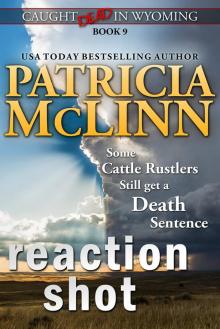 Reaction Shot (Caught Dead in Wyoming, Book 9)
Reaction Shot (Caught Dead in Wyoming, Book 9)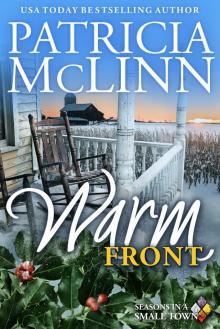 Warm Front
Warm Front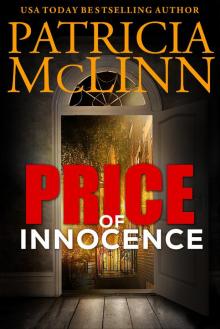 Price of Innocence
Price of Innocence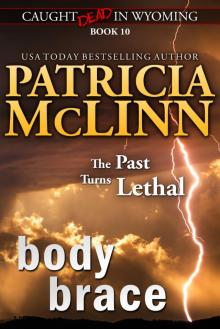 Body Brace (Caught Dead in Wyoming, Book 10)
Body Brace (Caught Dead in Wyoming, Book 10) Death on Covert Circle
Death on Covert Circle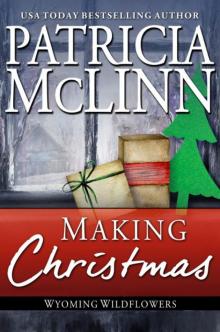 Making Christmas
Making Christmas Death on Torrid Ave.
Death on Torrid Ave. Death on the Diversion
Death on the Diversion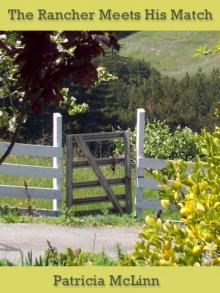 The Rancher Meets His Match
The Rancher Meets His Match Widow Woman
Widow Woman The Runaway Bride
The Runaway Bride Hoops
Hoops A Stranger in the Family (Book 1, Bardville, Wyoming Trilogy)
A Stranger in the Family (Book 1, Bardville, Wyoming Trilogy)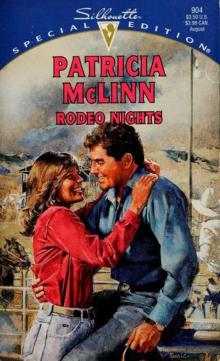 Rodeo Nights
Rodeo Nights Wedding Series Boxed Set (3 Books in 1) (The Wedding Series)
Wedding Series Boxed Set (3 Books in 1) (The Wedding Series)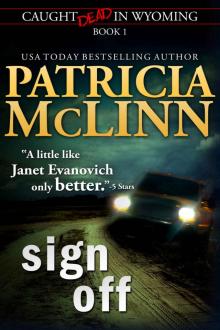 Sign Off (Caught Dead in Wyoming, Book 1)
Sign Off (Caught Dead in Wyoming, Book 1)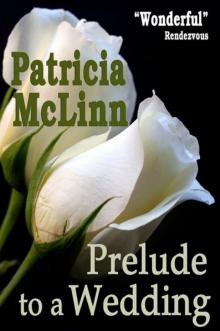 Prelude to a Wedding
Prelude to a Wedding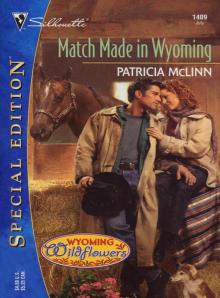 MATCH MADE IN WYOMING
MATCH MADE IN WYOMING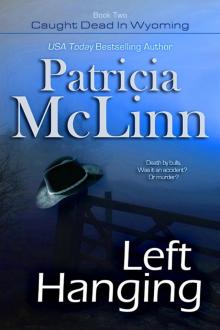 Left Hanging
Left Hanging What Are Friends For?
What Are Friends For?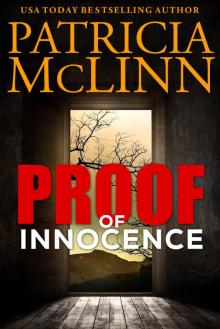 Proof of Innocence
Proof of Innocence Hidden in a Heartbeat (A Place Called Home, Book 3)
Hidden in a Heartbeat (A Place Called Home, Book 3) Baby Blues and Wedding Bells
Baby Blues and Wedding Bells Least Likely Wedding?
Least Likely Wedding? Heart Stealers
Heart Stealers Grady's Wedding
Grady's Wedding Right Brother
Right Brother Wedding of the Century
Wedding of the Century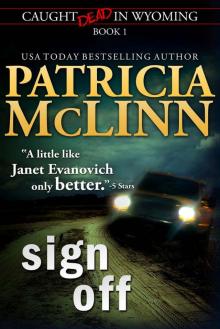 Sign Off
Sign Off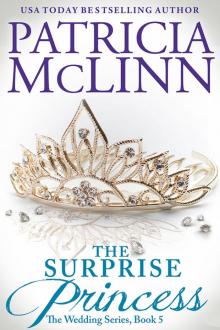 The Surprise Princess
The Surprise Princess Wyoming Wildflowers: The Beginning
Wyoming Wildflowers: The Beginning